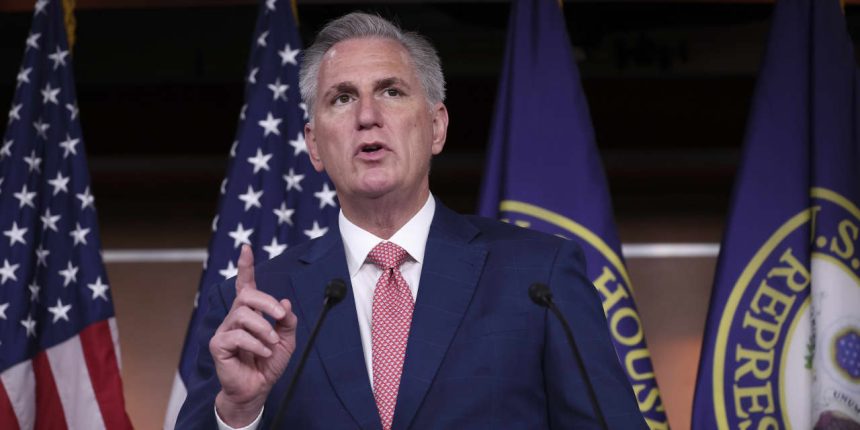Kevin McCarthy vowed just days ago to be “the adult in the room” when he forged a deal with Democrats to avert a government shutdown. In response, his party kicked him out of the room.
The historic ousting on Oct. 3 of the speaker of the House of Representatives, who was voted into office in January, leaves the party hamstrung and without a leader as Congress heads into what was supposed to have been a busy fall season of governing. It also appears to heighten the consequences for any future Republican speaker who dares work across the aisle, as McCarthy did.
As a result, the chance of a government shutdown in mid-November, when federal funding runs out, has spiked dramatically, adding to the economy’s pile of worries at time when interest rates and oil prices are rising, student-loan payments are resuming, and labor strikes are proliferating. A protracted fight over the speaker’s job—and after that, funding the government—could also spoil the soft-landing scenario that the Federal Reserve has sought to achieve as it seeks to tamp down inflation.
Not least, continued government paralysis and legislative dysfunction could invite a threatened downgrade of the U.S. debt by
Moody’s
Investors Service, the only one of the three major credit-rating firms that still gives the U.S. an AAA credit rating.
McCarthy’s ouster, engineered by a small group of Republican dissidents in the House, reinforces the view that even as deficits soar and the nation’s debt-servicing burden rises, there is little appetite in Washington to work across the aisle to address fiscal issues. “Increased D.C. dysfunction only contributes to an already bleak national fiscal outlook,” Steve Pavlick, a partner and head of policy at Renaissance Macro, wrote on Wednesday.
The most immediate challenge will be Congress’ inability to pass any legislation for at least a week, until a new speaker is in place. The first votes on a new leader are scheduled for Oct. 11, although without an obvious front-runner, it is unclear how long the voting process could take.
Rep. Patrick McHenry (R-NC) has taken over as interim speaker, but the rules are hazy as to what he will have the power to do since an interim speaker has never before taken the reins in the House. McHenry likely won’t be able to bring any legislation to the floor, although a majority in the House could vote to change the rules. House committee work will likely continue, but McHenry has declared the House in recess until both parties can agree on a path forward.
That means the speaker fight will narrow significantly the time window Congress has to hammer out agreement on a dozen spending bills that need to pass both chambers before a Nov. 17 deadline to avoid a government shutdown.
Even after a new speaker is in place, forging an appropriations package that the Republican-led House and Democratic-controlled Senate can both agree on has just gotten trickier. McCarthy chose to work across the aisle to avoid a damaging breach of the debt ceiling in June, and did so again this past weekend to avert a government shutdown. For that, he was pushed out of his job.
“Some on the right saw the opportunity to get rid of him, and Democrats didn’t reward him,” Pavlick told Barron’s. “So what is your incentive structure to pursue bipartisan deals if you’re McCarthy’s replacement? I just question that.”
Given the growing challenge of funding the government, the odds of a shutdown are on the upswing again.
Goldman Sachs
and BTIG, among other financial firms, both view a government shutdown in the fourth quarter as their base-case scenario.
“The near-term concern is that the House’s paralysis will further complicate the already complicated calculus surrounding the forthcoming funding fight,” BTIG’s Isaac Boltansky wrote on Oct. 3.
Government shutdowns have become a near-regular occurrence in Washington, and investors have learned largely to shrug them off as nonevents. But the economic impacts, though marginal at first, pile up, and a lengthy shutdown would be hard to ignore.
Gregory Daco, chief economist with EY-Parthenon, calculated before the stopgap measure was passed on Sept. 30 that the lost hours of work due to a shutdown, and the resulting hit to consumer spending would cost the U.S. economy an estimated $6 billion a week. That would mean shaving 0.1% off real GDP in the fourth quarter for each week that the shutdown lasted.
Given the apparent inability of Republicans to agree among themselves on a spending package, let alone one that Democrats would also support, most analysts expect that a shutdown this year, should it occur, would be longer than most.
There is also nothing on the calendar forcing the two sides to a deal. The last full government shutdown, which stretched over 16 days in 2013, ended only because it was tied to negotiations over the debt ceiling. Lawmakers finally came together just before the so-called X-date, which would have forced the U.S. into default with crippling economic consequences.
Beyond the economic drag, a shutdown would increase the likelihood of a debt-rating downgrade by Moody’s. Like other credit-ratings firms, Moody’s has a rating committee that constantly monitors fiscal and economic conditions within the U.S. While the committee has a regular review process, there is no specific timing for U.S. rating decisions, and meeting schedules aren’t publicly disclosed in advance, in contrast to European credit rating actions. There are multiple reasons why the committee could meet outside of normal reviews.
Fitch Ratings downgraded its view to AA+ after the debt-ceiling fight in Congress earlier this year, due in part to what it called an “erosion of governance,” while Standard & Poor’s lowered its rating on U.S. debt during a previous round of debt-ceiling brinkmanship back in 2011.
Even before McCarthy’s removal, Moody’s said it was monitoring the congressional budget fight. A shutdown, the agency said, would be “credit negative” for the U.S. and demonstrate that the intensifying political polarization could further constrain fiscal policy-making when the country is experiencing “declining fiscal strength, driven by widening fiscal deficits and deteriorating debt affordability.”
Moody’s ratings arm didn’t reply on Wednesday to Barron’s requests for comment on whether the speaker fight could lead to a debt downgrade. But economic analysts say the risk is there.
“That dysfunction on full display will almost surely at one point cause a reassessment of the U.S. credit rating,” says Joe Brusuelas, chief economist with RSM US.
Congress might have averted a shutdown for now. But the latest developments in the Capitol could pose even greater risks to U.S. financial stability. They put the damaging impact of political polarization in perhaps sharper relief than a shutdown might have, given that all legislative activity is now frozen and the outlook for compromise is dim.
And the shutdown could still be coming.
Megan Leonhardt contributed reporting.
Write to Megan Cassella at [email protected]
Read the full article here




